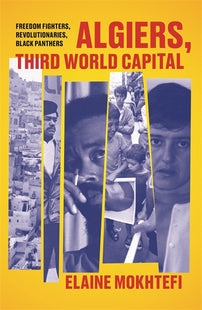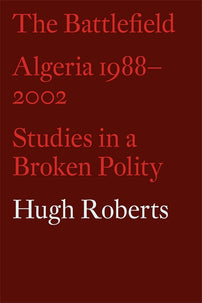Solidarity with Algeria’s imprisoned students!
Protests in Algeria have been building since the start of the year. The protests, that have already forced former president Abdelaziz Bouteflika to step down after 20 years, have lately been facing increasingly hostile repression from police and security services. In this interview with imprisoned student leader Yani Aïdali, he discusses the nature of the student movement, and the possibility of its generating a national-level co-ordination.

‘The students of Béjaïa University are marching every Friday, without being disturbed by the police’, explained Algerian student Adlène Belhmer in mid-April to the Nouveau Parti anticapitaliste – ‘except a couple of flics in civilian clothes, there’s been no sign of any police presence’.
But since later February, state repression has increased steadily against this mass, nationwide Ḥirāk (Movement). Women’s’ blocs were attacked first, in early April; from mid-June, Amazigh activists were targeted (around 40 remain imprisoned); and on Wednesday 18 September, de facto regime leader General Ahmed Gaid Salah announced that access to Algiers itself was blocked – though this only provoked a ‘marche grandiose contre Gaid Salah’, as the Algerian daily El Watan reported.
Last week, on Tuesday 8 October, scores of student activists were arrested, including Yani Aïdali, movement leader and member of the Parti socialiste des travailleurs (PST), itself part of the progressive Forces d’alternative politique coalition (on which, see al-Muzāharāt’s most-recent translation). As the PST said in its subsequent declaration, the arrests ‘constitute a new phase in the strategy of the illegitimate power’s strategy’.
In the following interview, conducted by El Watan on 25 September, Aïdali explains the state of the student movement, and the possibility of its generating a national-level co-ordination.
Al-Muzāharāt – ‘Demonstrations’ – is a new collective, translating left-wing documents and analyses from the Arabic-speaking world. You can follow them here.
As a leader of the movement, could you explain the state of things, seven months in?
Since the 22 February, the student Ḥirāk has stood the test of time, and gotten a permanent character. The mobilisation has stayed the same, despite the summer, Ramadan and university holidays.
Every Tuesday and Friday, we’ve had something like a popular referendum in the country’s streets. For sure, we can’t make a definitive assessment, since we’re looking at a movement that’s developing over the long-term, through its exigencies and its aspirations. But we can now, already, draw some provisional conclusions from which to proceed. In seven months, we’ve succeeded in getting rid of Bouteflika, in cancelling two presidential elections, and we have snatched more democratic rights – demonstrating in Algiers [despite the 18 September blockage], organising forums in public and inside universities, and so on.
We’ve seen many ministers from Bedoui’s government chased from plenty of wilayas [‘provinces’; administrative units] during official visits, which reflects a change in the balance of forces composing the political scene.
However, in order to save the regime through a presidential election [scheduled for 12 December] – one that’s totally rejected by the population – authorities are moving quickly and decidedly: lots of militants, protestors, including students, have been arrested these last few weeks.
On the face of it, the movement is still powerful, but it suffers from a lack of organisation at the base – that’s one of its weaknesses.
On this, what about the various attempts of organisation of the movement? Have the students managed to organise themselves in some national structure?
In terms of organisation of the movement, we’ve seen, over six months, some universities being able to organise themselves autonomously, but they’re not so numerous in comparison to the number of universities across the country. The different attempts at co-ordination have, unfortunately, not managed to start any national-scale co-ordination. But, the process remains open. I think that this will happen with this new academic year.
What will be the action plan of the student movement with the start of the 2019/20 academic year?
I don’t want to try and invent a plan of action on my own – this will surely be a work of collective reflection. However, the experience of the past year has allowed us to trace some important lines for the student movement. I think the imperative will be the structuring and organisation of the movement.
We have to give it a national, democratic and centralised form, which will carry democratic aspirations – democratisation of the university, freedom of association and organisation on campus, etc. – and also social aspirations; improving pedagogical conditions, employment prospects, etc, as well as political aims.
We also have to build bridges with the other popular fringes mobilised in the movement, first of all workers, the unemployed, and teachers.
On teachers, what’s their involvement in the students’ protest movement?
During the movement, teachers have played an important role in the mobilisation and they have participated in the students’ marches – sometimes in collectives, as was the case in Algiers II, the Houari Boumediene University of Bab Ezzouar, Béjaïa and Tizi Ouzou. They’ve even constituted their own bloc on marches. However, there’s a tendency to forget another university ‘bloc’.
It’s not only teachers and students in these establishments; there are also university workers who are involved. In Béjaïa, they’ve set up a collective that represents them and have contributed to debates, and the preservation of the mobilisation throughout the entire summer. The teachers and workers are going to be allies, and will be significant supporters of the student movement over the course of the coming mobilisation.
Some sources are speaking of a possible radicalisation of the student contestation. Should we expect strikes, as was the case in some universities last year?
On the radicalisation of the student movement, for the moment, we can’t do more than speculate, since students haven’t gone back to campuses, because of enrolment and catch-up exams.
What’s sure is that we should expect lots of strikes with demands concerning the political order – the departure of the regime, the freeing of the prisoners-of-conscience, the lifting of restrictions on democratic exercises – and also professional demands.
The question of graduation has been at the centre of the students’ preoccupations for several years now. The system of ‘License, Master, Doctorate’ (LMD), which promised to bring universities closer to companies, proved to be a chimera and only made the university serve the private sector. This system has done nothing to resolve the question of unemployment – the mobilisations will be here.
[book-strip index="1" style="display"]

